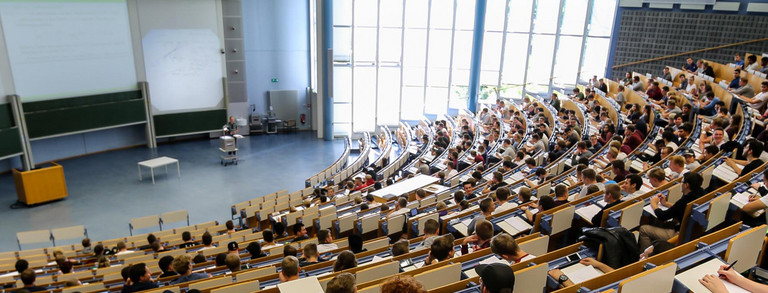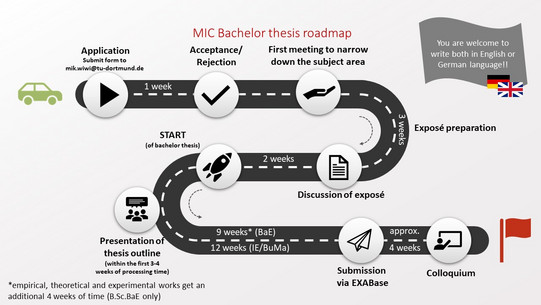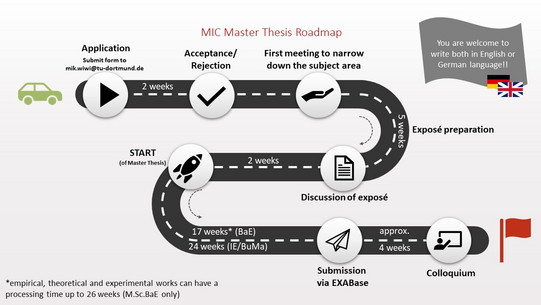Thesis at the at the professorship microeconomics
Thank you for your interest in writing your thesis at our Professorship of Microeconomics!
Here you will find all the information you need to successfully organise a thesis at our professorship and to be able to understand what we expect from you.
Ideally, but not necessarily(!), you have previously attended a seminar or an elective course of our professorship (You can find an overview on the main page of the teaching program).
The aim of the thesis is to introduce you to your own scientific work. There are, of course, gradual differences between Bachelor's and Master's thesis with regard to the requirements for your own work.
In order to successfully complete a thesis at our professorship, you must fulfil the following tasks:
- Observance of our rules for "scientific work"
- Details under Scientific work
- The rules contain information on the form and content of the thesis as well as the defence presentation and the exposé (the latter only for BA WiWi in the project seminar)
- Project seminar (compulsory only in the Bachelor of Business and Economics, details below in the schedule)
- Preparation of an exposé (4-5 pages) on the topic of the final thesis
- Presentation on the findings of the exposé (25 min. presentation + discussion)
- Graded (75% exposé, 25% presentation)
- Final paper
- Length, processing time and grading weighting according to your study regulations (information can be found here)
- You are welcome to write your thesis (and presentation) in German or English
- Defence lecture
- Length, processing time and grading weighting according to your study regulations (information can be found here)
- If there are no requirements on the part of the examination regulations, the length is: 25 min. presentation + 5 min. discussion
If you have any organisational concerns regarding your final thesis (forms, deadlines, ...), please contact our office at mik.wiwi@tu-dortmund.de.
Bachelor
If you would like to write your Bachelor’s thesis at our professorship, you can apply with the following documents:
- Bachelor’s application form
- Curriculum vitae
- Current overview of grades
- Short topic suggestion:
- ca. ½ A4 page
- Outline the topics that interest you. You may already have a specific idea or leading questions in mind.
Please send the documents in one (!) PDF file to mik.wiwi@tu-dortmund.de. You will receive a response within two weeks of the application deadline.
The application period for bachelor's theses in the summer semester 2026 begins on February 1 and ends on February 28, 2026. Feedback on applications will be provided starting March 9, 2026.
You will receive an acceptance or rejection within two weeks of receipt of your application. In case of acceptance, you will narrow down the topic of your thesis in subsequent talks with your supervisor. Once the final topic is agreed upon, you will need to provide an exposé within two/three weeks, which will be subsequently presented and discussed with your supervisor. Upon approval of the exposé, you can officially apply for your Bachelor’s thesis. Keep in mind that a certain number of ECTS in completed modules is needed in order to do so:
- Business and Economics: 120 ECTS (BA)
- Industrial Engineering: 165 ECTS (BA)
- Business mathematics: 120 ECTS (BA)
The Bachelor's thesis can then be registered with the examination administration. For Wiwi students, there are two weeks between registration and the start of the processing period. For WIng and WiMa students, the processing time begins on the day of registration. We will set the start date so that the Bachelor's thesis can be completed by the end of the lecture period (including the final presentation).
Afterwards you will continue writing your thesis guided via frequent meetings with your supervisor.
The thesis colloquium is scheduled for approximately four weeks after handing in the thesis via EXABase. You will then receive your overall grade.
Note that all these steps should help you in writing your thesis. If there are any serious problems concerning the content of the thesis or (especially) regarding the meeting of deadlines, please inform us immediately so we can provide you the best kind of support.
The module “project seminar” includes all work steps from first meeting to narrow down the subject area to presentation of thesis outline (see roadmap). These steps are inherent parts of the thesis. You apply automatically for this module once you received the acceptance for the Bachelor’s application form. Students of Business and Economics will obtain a grade after the step presentation of thesis outline. The project seminar is then passed.
Master
If you would like to write your Master’s thesis at our professorship, you can apply with the following documents:
- Master’s application form
- Curriculum vitae
- Current overview of grades
- Short topic suggestion:
- ca. ½ A4 page
Please send the documents in one (!) PDF file to mik.wiwi@tu-dortmund.de. You will receive an acceptance or rejection within two weeks of receipt of your application. In case of acceptance, you will narrow down the topic of your thesis in subsequent talks with your supervisor following a five-week period providing and presenting/discussing a first insight/exposé into your topic. Upon approval of the exposé, you can apply for the Master thesis. Keep in mind that a certain number of ECTS is needed in completed modules in order to do so:
-
- Business and Economics: 60 ECTS
- Industrial Engineering: 40 ECTS
- Business mathematics: 60 ECTS
After two weeks the writing period of the Master thesis starts.
The thesis colloquium is scheduled for approximately four weeks after handing in the thesis via EXABase. You will then receive your overall grade.
If there are any serious problems concerning the content of the thesis or (especially) regarding the meeting of deadlines, please inform us immediately so we can provide you the best kind of support.
Current thesis topics
You can write both theoretical and empirical theses at our department. You are welcome to approach us with your own topic ideas in the field of microeconomics. We also offer topics on the following subfields of microeconomics, among others:
- Applied game theory
- Labor market economics, in particular:
- Job search behavior
- Wage negotiations
- Personnel economics
- Regional economics, in particular:
- Regional effects of industry shocks and adjustment mechanisms
- Regional inequality
- Migration as an adjustment mechanism, role of spatial frictions
- Structural change, in particular:
- Regional effects of structural change
- Role of industrial policy measures
- Behavioral economics, in particular:
- Decision under uncertainty
- Behavioral economics of the public sector



